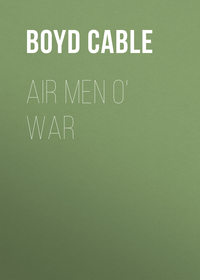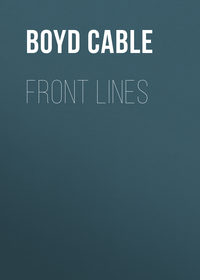 полная версия
полная версияDoing their Bit
III
SUBLIME TO THE – SUBLIME!
The car had run into the closer traffic of the town, and the engineer was still pointing out various works that had been converted from all trades under the sun to the one and only that counts to-day, when he dropped a remark that roused a fresh current of curiosity. “It isn’t only regular business firms that are in on this game, you know,” he said. “There’s a good story I must get the Eastern district man to tell you, about an old-clo’ Jew that wanted to switch his jet-bead machines or something and his horribly sweated bonnet-makers on to war work. He’d have taken on any contract he could grab too, from 15-inch shells downwards. But the day’s long past when a man can hook a contract on the gamble of sub-contracting it out, so our Jew misfired that lot. I rather fancy his bonnet hands are button-holing cartridge-belts or something now, though. But clothing and kit isn’t my line, and I don’t know the details, and I’ve plenty of queer conversion cases inside my own job. There’s one little place I have now would tickle you. The factory is a top back bedroom in a little side street, the machinery is one knock-kneed, rheumaticky lathe, and the factory staff is one old man, although, between ourselves, I believe his old missus takes a turn and keeps the lathe running while he’s asleep. The room isn’t big enough to hold the lathe and the length of brass rod that feeds into it and turns into a fuse-part, so they’ve knocked a hole in the wall and the brass rod sticks out through it and works in again through the lathe an inch at a time. Then there’s another little place something after the same style to begin with, but growing a lathe at a time. It’s just down the street here, and we pass it presently.”
And presently, at my request, the car slowed, sidled cross-traffic, and halted outside the door of an ordinary, rather dingy-looking street-door. When we rang and were admitted we squeezed past the packing-cases that filled the narrow “hall,” climbed a steep stair, and were shown into a parlour that might have been transplanted bodily from a Bloomsbury boarding-house. Anything less promising of munition work it would be hard to find, but presently the manager-owner-engineer came along and fetched us to “the works.” He was mighty proud of those same works, and small blame to him. He had started with a single lathe and now here he had half a dozen running off the power of a tiny engine tucked away in the corner. The lathes had been purchased one at a time as each earned the first instalment to pay for the next, the Ministry encouraging and helping the effort substantially. Now the lathes were hard at work, packed so close that one had to twist sideways to move between them, and bright little scraps of polished metal ranged in rows gave proof of the capability of men and machines and of the organisation and energy that are running through the tiniest of Industry’s veins and are going to beat Germany’s greatest efforts in the long run. In an empty lumber-room upstairs we were shown a complicated and ingenious machine that represented the former employment of the owner; and pushed away in a corner, dusty and dull and tarnished, neglected and forgotten, were pieces of the work the machine had been turning out, work which had been dropped completely, and, more than that, which represented a trade and a connection, long and slow in the up-building perhaps, which also had been dropped completely. Here were buttons and belt-clasps and trinkets of silver and enamel and dainty cloisonné work, glowing with all the radiant colours of the rainbow, flecked with inset gleaming gold and delicate silver sprays and tendrils. “Eastern trade mostly,” said the proprietor, “India and Egypt and Turkey and so on. The natives like ’em, I suppose.”
Natives – yes. But instantly visions came back to me of Arabs chaffering on the deck at Port Said, of the dark and scented interior of a Japanese shop in Singapore, of a native pedlar squatted in the hot sun before the hotel veranda in Sourabaya, and the assurance of the seller, shrill and emphatic to the questioning tourists, “Native work, sah! Re-al native work!” And here in a back attic in England – I daresay the proprietor wondered why I grinned at his pretty trinkets and his big machine.
And then as we clumped down the stairs and into the street again the engineer made a remark that I must go back a little to make understandable. “Rather a case of ‘the sublime to the ridiculous,’ isn’t it?” he said, and in that he was referring to the works we had been over that morning and had just left. I had been shown these as a good sample of what a “converted” works could do. In pre-War days the firm were makers of a certain part of railway locomotives. They were entirely specialists in this work, and employed many specialist hands and a vast amount of specialist machinery on it. But now the whole of their locomotive work has been set aside, and the whole energy of the shops is turned on to war work. Some of the old machines, lathes, and so on had been ingeniously adapted by the making and fitting of new tools to their new work, and other new munition machinery has been introduced wholesale. We walked through huge rooms filled with heavy lathes, grinding, scraping, and screaming on the boring and turning of blocks of steel that were growing swiftly under our eyes to the familiar shape and semblance of shells. We followed the rough steel billets through all their processes, the shaping and smoothing of outside and inside, the grooving of the base to take the copper driving band, the cunning scoring out of a “wave line” in the groove, the fitting on of the copper band and its clutching in a giant steel-fingered closing and opening hand that squeezed the copper inexorably into its place and tightly into the “wave line,” there to grip and prevent it slipping under the terrific wrench and spin the rifled gun would give it. This “banding press” was a new machine just installed and putting through its first shells while we were there. It was merely another word in the same story I have heard throughout the munition works. “It will speed up the output a good deal,” said the manager complacently as we watched. “We’ll be doing another so-and-so per cent. when it’s running.” In another vast chamber we saw “pineapple bombs” or hand grenades being made – “pineapple” being a neat description of the shape and criss-cross pattern of lines marking the segments into which the grenade bursts. In the foundry the floor was covered with rows upon rows of square-shaped, dark-grey boxes, and with other square boxes bearing what looked like the impressions of small dumb-bells. Men were busy about these boxes, the moulds for the casting of the bombs, and at one end of the room other men were tapping and prodding at an up-ended boiler-looking arrangement. From this, when the clay stopper had been knocked out, a jet of molten metal shot in a glowing, pinky-red stream running like water from a tap into the heavy bucket in place to receive it. When the bucket filled, a fresh plug of clay stopped off the stream, and instantly the bucket swung off, swaying in the grasp of chains and hooks that ran on overhead rails to the waiting moulds. The bucket checked and tilted at each mould and the liquid metal poured smoothly into its appointed place until the bucket was empty. After the rooms where the lathes rumbled and roared, and the riven steel grated and squealed under the cutting tools, and the hammers jarred and pounded incessantly, this foundry was strangely un-noisy; but here, as in all the other rooms, there was the same sense of bustle, of rush, of speed, of driving the work; and the spurting jet of hot metal, the glow of the furnace, the dull roar of the fire, the hoarse blowing of air through a nozzle where the moulds were being blown clear and clean of dust and sand, the clink and rattle of tools, the movements of the stripped and sweating workers – all gave their own sure impression of haste and activity. “Thirty thousand a day we’re turning out of these,” said the manager, “and we’ll better that presently.” Now, you bombers of the “Suicide Clubs” might note this – 30,000 grenades a day are being turned out by this one firm, a firm which only devotes a part of its work to grenades. This is only one firm out of many I have seen, and very many more, no doubt, I haven’t seen, and one particular make of the many makes you out Front know are being made. Does it give you any realisation of the number of grenades you will be getting presently? I hope so. I hope you will understand and be sure that never again will you be “bombed out” of a captured trench because your supplies of grenades ran out. And I hope Herr Fritz across the way in the front trench also understands and appreciates the prospect.
From the foundry we passed back into the workshops, picking a way round and past and between stacks and piles of shells in every stage of roughness and completeness; we climbed stairs, wandered over many more floors, and many acres of man- and machine-filled rooms, and came at last to one large, empty room. In it there were machines in plenty, but no man or woman. The walls echoed emptily to our steps and voices, the machines were still and silent, dust-covered, dingy, forlorn, and abandoned; and piled in the corners, on and under the benches, anywhere out of the way, were heaps of the locomotive parts on which the firm was once solely engaged. There were many thousands of pounds’ worth of these parts and of machinery standing idle, and one might have expected the sight and the thought of all his own diverted specialist knowledge and experience to have brought sadness and melancholy to the mind of any manager. But here the manager had evidently no regrets and no time to waste on memories. “We couldn’t adapt any of this machinery,” he said lightly, “so we’re going to clear it out, and fill this place up with new shell-making plant.” But, after all, that sentence only summarises the whole scheme of this munition business. The man or the machine that cannot or will not be adapted to war work is ruthlessly cleared out and replaced by man or machine that can. It is to the everlasting credit of the men that so many of their machines have been cleverly adapted, that so few of themselves could not be, and that still fewer – if any – would not.
The factory was knocking off for dinner as we came away, and the car ploughed out through a hurrying crowd at the main gate and down a dividing sea of workers in the road outside.
So now you will understand – to come back to where I broke off at the street-door of the humble workshop of the one-time maker of enamel buttons and “re-al native work” – what was in my engineer’s mind when he made that side remark: “Rather a case of ‘the sublime to the ridiculous,’ isn’t it?”
But it doesn’t altogether strike me that way. After all, the trinket-maker upstairs was “doing his bit” to the best of his ability, just as the manager in the locomotive works was doing his. When you think of it, there is something rather fine in that single-track footy little business cheerfully climbing out of its established groove and plunging off along the new and unknown path of war work. If we take the trinket-maker, and that other old man and his wife with their brass rod sticking out through a hole in the wall, as samples and specimens of the spirit that is animating the Empire and its workers to-day, it is a thing to be mightily and devoutly thankful for. It is not, if you look at it aright – the huge humming locomotive works and the sometime button-maker – any case of “the sublime to the ridiculous.” I am not sure, in fact, that it is not rather The Sublime to the More Sublime.
IV
SHELLS AND MORE SHELLS
It would be impossible for me to describe in detail all the factories I was able to see, but in many of them I gleaned particulars which show plainly the way that war work is being pushed through. I suppose that if there is any one branch of munitions which the Front wants to hear about it is the output of shells. Shells and guns count for so much nowadays, a devastating artillery fire so eases the work of the attack, a heavier opposing fire is so appallingly destructive to an advance, the whole moral and physical effect of a superior artillery is so great, that I know well how very welcome a word it will be to the Front that shells of every size, weight, and calibre are pouring out from the factories in a stream already tremendous, but not yet nearly at its full volume.
One of the most inspiriting sights I saw on my tour was in the foundry of a shell factory where the rough forgings were being put through the first stages of their progress to completed six- and eight-inch shells. The foundry was a vast place, with chinks of vivid light glowing through the row of furnace-doors and lighting the hot gloom, the vaporous film of smoke and steam, the bulky machinery looming dimly through the half-dark, the hurrying figures of the workmen. A furnace-door slams open, and a burst of glaring light glows fiercely over the shop; long irons plunge into the flaming gap, and poke and prod and hook hastily about the fire; a lump of glowing steel rolls out, tips over, and thumps down on the inclined floor in front of the furnace. There is a babel of yells, the rush of flying feet, the clatter of a truck-barrow, and the red-hot billet of metal is pounced upon, snatched, and twisted on to the hand truck, rushed to where men wait its coming grouped about a lumbering press whose massive bulk towers aloft into the misty gloom. The hot metal is clutched and jerked into position under the heavy punch, and instantly the machine, with a gigantic hissing sigh, moves and thrusts downward a smooth-moving but irresistible punch. A gush of flame and burst of thick black smoke leaps upward and vanishes swiftly, the punch presses home, stops, reverses, pulls up and out again. The machine breathes another steamy sigh, twists the first punch aside, poises another an instant over the red, glowing metal, and again thrusts, plunging down upon it. One after another the full set of punches take their turn and squeeze and press their shape upon the plastic steel. Then the last punch draws out, and two men jabbing with long levers hook out the metal, still glowing hot but transformed in these few seconds from a rough round block to a hollow cylinder; chained pincers grab the cylinder and swing it rapidly to the drawing-press, where the tough steel is pulled out like putty and drawn to its required size. When it has worked its will the drawing-press disgorges the cylinder, cooled now to a deeper hot rose-red, tumbles it out on the floor, and waits ready for its next mouthful, while men trundle and roll the hot cylinder across the floor to rest and cool beside the long row that lies fading off from rose to blood-red, to darker and duller crimson, and through deeper and darker shades to cold grey and black. And as the punches were jabbing at the one hot billet another was falling from the furnace, and another was being worked in the draw-press, or rolling from it rapidly across the floor to the cooling place. Several gangs of men, several punches and presses, were all working at a top pressure of speed; the foundry was filled with the roar and rumbling and hissing sighs of the machinery, the clatter of trucks, and clank of levers and chains and pincers, the thump and thud and roll of the falling and moving billets, and every now and then the outburst and clamour of shouting voices, the swift rush of hurrying feet. The opening and closing doors of the furnaces, the fierce glow of the fires, and the white- or red-hot steel billets, the spouting gush of flames and sparks from the first thrust of the punches, threw in turn a mantle of searing golden light, of radiant orange, of dusky red, on the gleaming machinery, the running figures of the men, their thrusting and pulling arms, heaving, jerking shoulders, wet, glistening faces, shining, white-glinting eyes and teeth. The foundry was palpitating and alive, humming and trembling, panting and quivering, with savage, incessant haste, with sweating, driving energy, with a splendid and ordered virility. It did one’s heart good to stand there and watch billet after billet thud down from the furnace to the floor, to see the giant machinery beat and squeeze them into shape, to hear the calling and shouting, to sense the stir, the whirling rush and drive of the work. And “drive” was the key-word of the whole factory, as I found it is of most munition factories. Here, again, the manager who showed me round was most openly anxious to get the last possible ounce of output from his plant, and to add and add and keep on adding to plant and output. Every process of the work is under constant scrutiny, and every possible time- or labour-saving device has only to be tried and proved to be instantly adopted. Here I was shown under construction a new plant for cleaning out the finished shell; there a newly installed arrangement for the quick and even painting of the shells by air-brush spray; everywhere throughout the works similar dodges for cutting down the time and labour, for speeding up the output. And always remember that in war work cutting down time and labour does not, most emphatically does not, mean reducing the working hours or the number of hands. It only means finding time for more work, freeing hands to turn on to more work again. Anything that will save skilled labour especially, will allow the experienced engineers to “go round” a little better, spread over the unskilled hands a little more, is hailed as a godsend. In this particular factory there are 2,000 hands – I should say were, because that is some weeks ago now, and many changes come in a few weeks’ munition work these days – 2,000 hands, and of these there were only sixty men who were engineers, were skilled men. I asked what was the proportion amongst those men I had watched grabbing and slinging about the white-hot billets, handling them and the huge power machines so smoothly and skilfully. “Those,” said the manager simply, “were all unskilled no more than a matter of months ago. Milkmen, and market gardeners, and carters, and all sorts they were, red-raw new to the job, and never inside a shop or handled a tool till they came in here.” It seemed incredible, but I found plenty of similar instances since, and the munitions engineer who was going round with me assured me these things are the rule rather than the exception. So apparently war work is not only making shell factories out of sewing-machine and tobacco works, munition contractors out of enamel-button makers, munition machines from bicycle- and clock-factory lathes, but is also manufacturing as a by-product engineers and mechanics from milkmen and all sorts of similar unlikely material. This manager had the same old story to tell of increasing plant and hands and output. I stumbled over a litter of planks and bricks and mortar and building material outside this factory, just as I have outside many others, and saw the half-built furnaces and half-laid concrete engine-beds, and listened to the tally of the work under construction and the machines on order or delivery, and the increase of output that would result. This factory is doing six- and eight-inch shells mainly, but the same increased-output programme belongs to every other make in every shell factory I saw. One place is almost ready to commence delivery of some hundreds of twelve-inch shells per week as a new addition to their present output of many thousands of eight-inch shells and forgings of six-inch shells per week, as well as completing a portion of the six-inch. I saw at this place piles of new lathes and motors waiting to be erected, and saw the new shops that have used up 4,000 additional new hands.
Another factory commenced building a six-acre shell factory in June, is now employing 1,600 hands, and increasing them to 2,500 as quickly as possible. At another place the present factory, covering many acres, crammed to the doorstep with machinery and workers, stands on a site which before the war was an open green field. Now it employs 6,500 hands and is adding about 200 hands a week. Yet another place was an empty and idle building in July – in all these months mentioned I refer to the year 1915 – but now it is turning out 5,000 shells a week, and it is to reach 20,000 a week within the next few months. All these are merely instances, picked at random from my notes. I could multiply them, and in every district I visited the local Munitions office could, if they were permitted, have given me figures and dates of this kind almost without end.
Before I finish this chapter I must pass along a message that the workers at a certain national shell factory gave me for the men at the Front. I had been telling the general manager how good it was to see the stacks of shells, the ceaseless flood that was running through the works, to hear all he had been telling me of the progress made, and still more of the further progress to be made, and I was led on to tell him something of the heart-breaking shortage of shells we had known a year ago, the punishment the troops had suffered again and again from the heavy artillery fire of the Germans, and the slow and grudging reply that was all we could make. The manager asked me would I talk to some of their shop foremen and tell them what a shortage of shells meant to the Front. So he called in about a score or more of his men and I just talked to them, and told them how the Front was hanging on the efforts of the war-workers at home. I told them of that winter in the trenches, of the hopes we had held to of plenteous supplies of shells in the spring, of the blow it was to us to hear of as great a shortage as ever, and, still worse, of the squabbling amongst munition workers and their haggling over 8d. or 8½ d. an hour pay, or Saturday half-holidays, or double overtime for Sunday, while the men in the trenches suffered a hell of shell-fire, and soaked in knee-deep gutters, and lost their limbs and lives from frost-bite, and put in six- or sixteen-day spells, as need be, with no half-holiday and a shilling a day pay for time and overtime. Maybe there was no special point in my telling these particular things to these particular men, because, as their manager assured me, that factory was doing and always had done its level best, and there had been no friction or slacking whatever in any department. But anyhow I told them, and I told them the Front was hoping again for a flood of unlimited shells this spring, for the essential wherewithal to break the lock-fast lines in the West, for the munitions that would at last give us a fair fighting chance – the more than which we don’t want, and don’t need, to give us victory. And the men heard me out, and after I came away it appears that these foremen and charge hands went back to their shops and told their men what I had said, and by and by their manager sent me a resolution and a pledge they had passed and signed. When I think of the ring of earnest faces that surrounded me as I talked, of the group of figures in their oil-stained overalls in the office built over the workshop where the lathes and hammers and punches and presses around and underneath us sang their ceaseless song of Shells and Shells and more Shells, I feel that this is a resolution to be fulfilled to the hilt, a pledge to be carried out to the last shrapnel bullet. And here I give you their message, leaving out only the name of the factory and the names signed at the end: —
“Dear Sir, – We, the managers, foremen, and charge hands of the above factory, who listened with grave interest and concern to your description of our brave lads fighting in France and Flanders, and the hardships they have to endure, due in lots of cases to lack of shell, desire to place on record our thanks to you (who have been through the mill) for putting the matter so clearly before us. We also pledge ourselves, and desire you to inform our lads at the Front, that, so far as we are concerned at the – National Munitions Factory, we are working diligently, harmoniously, and sticking it, and will continue to stick it, with the one object of getting out of the above factory Every Possible Shell. We trust that our rapidly increasing output in shell will help to fill those empty limbers you mentioned so feelingly in your remarks. – With kind regards, we are, dear Sir, yours very sincerely.”
That, I know, is the heartening sort of message you want to hear out Front, and it expresses, only more clearly and emphatically, what I have heard from other shell-makers throughout the Kingdom. “Every possible shell!” Think what it means, you at the Front. And you think of it too, Fritz Boche.





